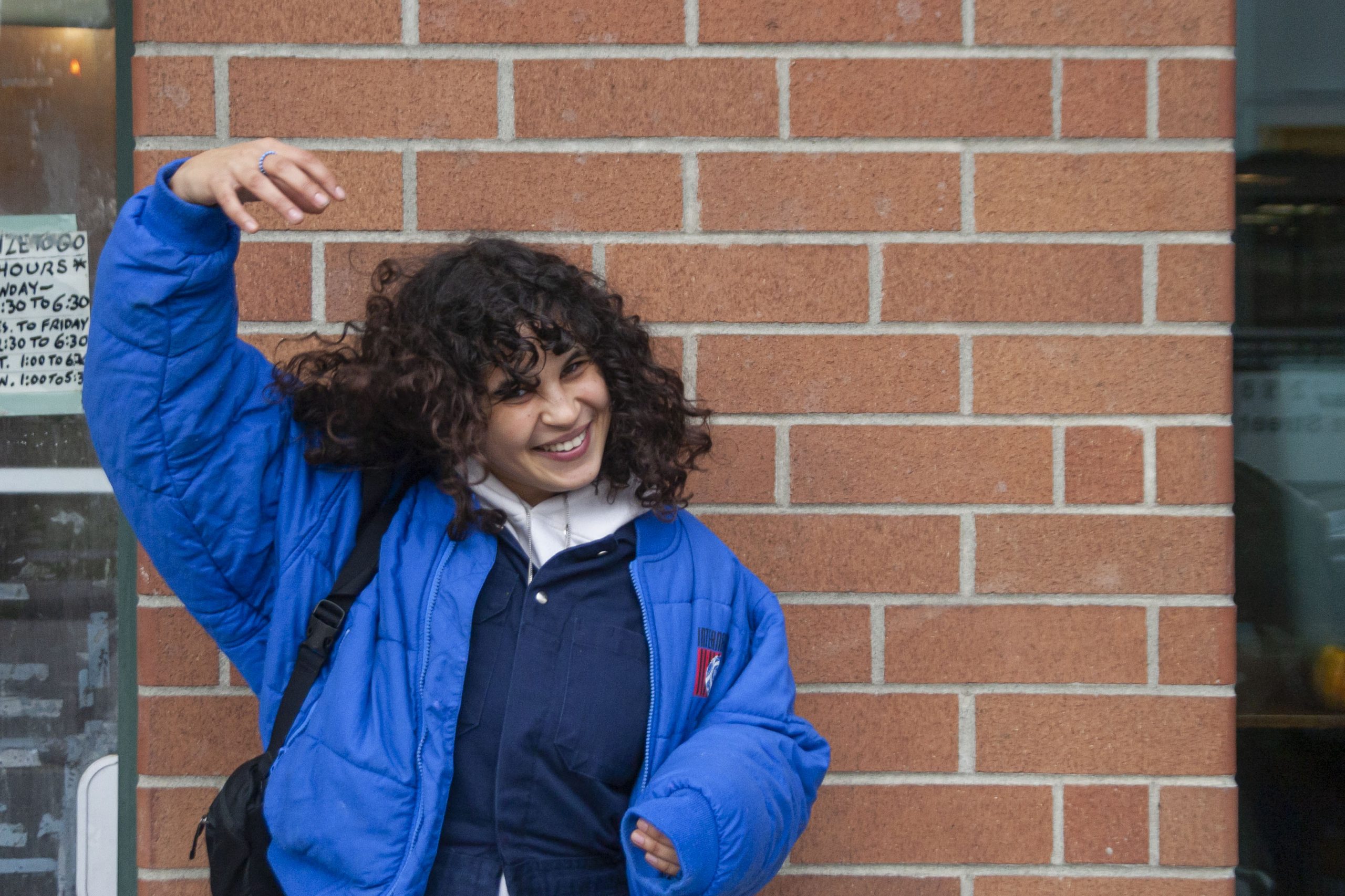You stand on the edge of the platform, skateboard in hand, preparing to drop into the bowl for the first time. Your thumping heart intensifies as you stare down at the graffiti-painted pavement and prepare yourself for the excursion. Your forehead glistens with sweat as you breathe in deeply and exhale slowly. In the blink of an eye, grit overcomes fear as you drop full velocity down into the ramp. Just to fall when you are halfway down and scrape your knee. But at least you overcame fear in a heartbeat. Sometimes, the paramount nature of anxiety can prevent us from ever dropping in a bowl. Instead, you stand on the sidelines board in hand, watching as your friends fail and get back up to try again. Too afraid to stand on the pedestal and dive into the bowl. Even if a splatter of blood is far more rewarding than voyeurism; permitting fear to steer your inaction.
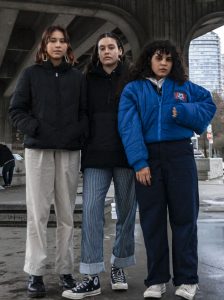
Every skateboarder is familiar with fear as they must overcome the apprehension to learn new tricks. A newbie can recall the moment they were skating rapidly down an incline when their board started swivelling back and forth, and they had to make an instant decision whether to jump off or press their foot against the pavement to slow down. In most cases they eventually tumble down and scrape their skin. Ryme Lahcene, artist, teacher and skateboarder, shares how fear impacted her relationship with sharing art. How the fear one encounters when skating down their first high incline often feels the same as revealing your sketchbook to friends for the first time. A bruised ego can feel as bad as a broken 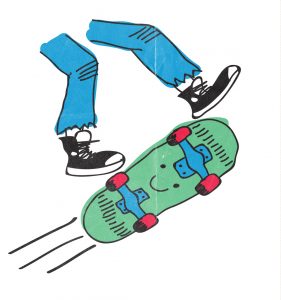 arm. For Ryme, fear is the intersection that connects skateboarding to art. She says, “I learned to skate pretty recently, like two years ago. When learning to skate, I think one of the big things that I have learned is my relationship towards fear and how for a very long time, actually most of my life, I have lived in fear, remained in fear. And I guess I had not learned the ways, or the tactics to get over it and that reflected itself in my art. I was too shy to share that side of me. I had never shared it. Most of my friends did not know I draw. It was very vulnerable to share that side of me. It was because I feared rejection, I feared that people would think I was not enough, not cool, dumb shit, you know. And I know if it had not been for skateboarding, I would never have started my zine project. That was the first time I was making art and sharing it with the world in a very public way.”
arm. For Ryme, fear is the intersection that connects skateboarding to art. She says, “I learned to skate pretty recently, like two years ago. When learning to skate, I think one of the big things that I have learned is my relationship towards fear and how for a very long time, actually most of my life, I have lived in fear, remained in fear. And I guess I had not learned the ways, or the tactics to get over it and that reflected itself in my art. I was too shy to share that side of me. I had never shared it. Most of my friends did not know I draw. It was very vulnerable to share that side of me. It was because I feared rejection, I feared that people would think I was not enough, not cool, dumb shit, you know. And I know if it had not been for skateboarding, I would never have started my zine project. That was the first time I was making art and sharing it with the world in a very public way.”
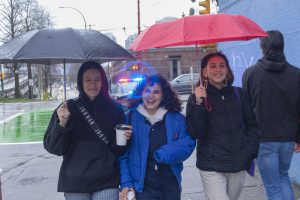
For Lahcene, intertwining art and skateboarding enabled her to overcome fear by sharing the zines she makes with others all across the city. From September 2018 to October 2019, Ryme publicly shared a new zine every month. Overcoming that deeply ingrained fear has allowed her to inform folks about topics such as consent and the declining bee population. But she has also, in turn, encouraged others to pursue artistic endeavours by hosting art workshops at All Abroad and takeovers at Vancouver Plaza Skatepark. These workshops enable injured skaters to stay involved in the scene, even when they cannot physically participate. Inclusivity is a core value for the skate community. Ryme states “when I was thinking of the takeovers and what they represented, circular education was one of the big foundations.”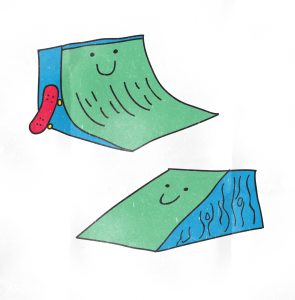 Circular education aims to encourage leadership skills to tackle sustainability and social responsibility within our current socio-political and economic environment. Ryme continues “but also, how do we create more inclusive and welcoming spaces. I thought a lot about art-making and how we are all creators and how it brings people together. And to be able to sit together and make something, and create — that is so amazing. It builds connections. And the whole idea behind the takeovers is to bring people together. The art workshops are about offering opportunities for people to make; I think a lot of us are scared to express ourselves.” The art workshops were a success that started when Ryme’s friend broke their ankle but still wanted to attend the takeovers. One week a skater would bring a skateboard, an empty canvas, and people would collaborate by painting together. Next they would be making flowers.
Circular education aims to encourage leadership skills to tackle sustainability and social responsibility within our current socio-political and economic environment. Ryme continues “but also, how do we create more inclusive and welcoming spaces. I thought a lot about art-making and how we are all creators and how it brings people together. And to be able to sit together and make something, and create — that is so amazing. It builds connections. And the whole idea behind the takeovers is to bring people together. The art workshops are about offering opportunities for people to make; I think a lot of us are scared to express ourselves.” The art workshops were a success that started when Ryme’s friend broke their ankle but still wanted to attend the takeovers. One week a skater would bring a skateboard, an empty canvas, and people would collaborate by painting together. Next they would be making flowers.
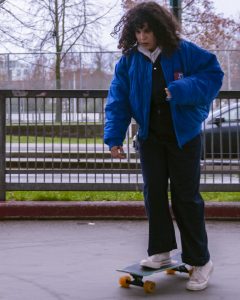
The takeovers invade a space dominated by male skaters. Their purpose is to actively diversify the skate scene by opening up a welcoming environment to those underrepresented by mainstream skate culture. The skate community’s gatekeepers, cis men, prevent inerested marginalized folks from trying to land a kick-flip. But organizers like Ryme open access to all those who want to try a new sport. At takeovers, non-binary attendees feel at ease by other skaters inquiring about their pronouns, ensuring they are respected. A simple conversation too often dismissed at your average skatepark on a sunny day, thereby eliminating barriers associated with the anxiety of entering a space. Ryme recognizes that “you cannot create a one hundred percent safe space, but we can try,” however, by putting in the effort to break down barriers that prevented myself from learning to skate when I was 13 because I was intimidated and afraid of 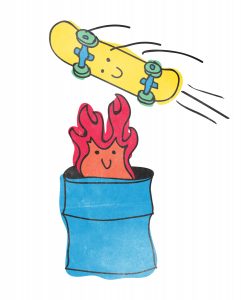 ridicule. So, instead, I would skate in my parent’s garage until I felt confident enough to glide along the sidewalk. But never at a skatepark as populated by cis-male skaters as Vancouver’s Plaza. Just like Ryme, fear prevented me from entering the skate park by my house despite how badly I wanted to learn how to kickflip. The effort taken by Ryme is quintessential in providing an opportunity for womxn, femmes and LGBTQ+ skaters to shred, and try out some tricks in a space that makes them feel welcomed. The skate media mogul Thrasher magazine has only featured three women on the cover and has been publishing since January of 1981. Ryme speaks about how “learning to skate influenced to doing more, living less in fear, and giving myself chances just to try things out and do things for the sake of doing and not for whatever other reasons; that has been very empowering.” Maintaining inclusivity in the takeovers involves being friendly and not acting above anyone, but instead accepting those showing up and having a good time together. Ryme has formed a support structure for skaters, young and old, who congregate every Sunday at the skatepark. To fall and learn together whilst generating a collective sense of self. You are never too old to try something new, all you need is the courage to step out of your comfort zone and onto a deck.
ridicule. So, instead, I would skate in my parent’s garage until I felt confident enough to glide along the sidewalk. But never at a skatepark as populated by cis-male skaters as Vancouver’s Plaza. Just like Ryme, fear prevented me from entering the skate park by my house despite how badly I wanted to learn how to kickflip. The effort taken by Ryme is quintessential in providing an opportunity for womxn, femmes and LGBTQ+ skaters to shred, and try out some tricks in a space that makes them feel welcomed. The skate media mogul Thrasher magazine has only featured three women on the cover and has been publishing since January of 1981. Ryme speaks about how “learning to skate influenced to doing more, living less in fear, and giving myself chances just to try things out and do things for the sake of doing and not for whatever other reasons; that has been very empowering.” Maintaining inclusivity in the takeovers involves being friendly and not acting above anyone, but instead accepting those showing up and having a good time together. Ryme has formed a support structure for skaters, young and old, who congregate every Sunday at the skatepark. To fall and learn together whilst generating a collective sense of self. You are never too old to try something new, all you need is the courage to step out of your comfort zone and onto a deck.


